
College News
New CCCC Chatham buildings rise
06.29.2010 • College & Community, Facilities/Buildings
PITTSBORO – Bricks and mortar are growing greener at Central Carolina Community College in Chatham County as construction moves forward on three new buildings. All are expected to be awarded the U.S. Green Building Council’s Leadership in Energy and Environmental Design (LEED) Gold Level certification –or higher.
LEED is the national standard for the construction of green buildings, which are designed and constructed to conserve both energy and resources while creating inviting environments for those who use them.
The Sustainable Technologies Center and a joint county-college Chatham Community Library are nearing completion on the Chatham County Campus, in Pittsboro. The new Siler City Center in the Central Carolina Business Campus, in Siler City, is expected to open in January 2011.
Green construction, also called sustainable or eco-friendly, uses natural and/or recycled materials and incorporates sunlight and terrain into the design and siting of buildings. It utilizes resource-conserving systems, such as water recycling and solar power.
“We are excited and pleased that Chatham County and Central Carolina Community College are among the leaders in the greening of America,” said CCCC President Bud Marchant. “As an educational institution, the college is committed to minimizing its carbon footprint on the Earth. These new buildings embody the environmentally sustainable principles the college teaches in its green programs.”
The classroom and library on the Chatham Campus share a wastewater reclamation and recycling system that is one of the most advanced in the country. Hal House, president of Integrated Water Strategies, in Chatham, designed the innovative system, which uses a series of sand filters and plants to clean the water.
The recycled water will be used for toilet flushing, irrigation and other non-potable water uses. Using recycled water significantly reduces the amount of potable water drawn from the county water supply.
Both buildings will be connected to a highly efficient central heating and cooling plant that uses evaporative cooling and recycled water. All the landscaping around the two buildings will be low-maintenance native plants that require minimal water. Roof solar energy collectors will heat the water for the buildings.
Back in 2005, the college requested and the Chatham County Board of Commissioners agreed to construct additional facilities to serve the college’s ever-growing enrollment and the county’s increasing need for workforce training. The decision to use green construction fit in with their concern for the environment and the desire to showcase what the county and college are doing in sustainability.
Chatham County is committed to preserving its scenic environment and open spaces, while encouraging local, sustainable industry and agriculture. Central Carolina C.C. is nicknamed “Green Central” for its leadership in the promotion and development of green workforce training programs.
"CCCC is an educational leader in sustainable building practices," said Sally Kost, chair of the Chatham County Board of Commissioners. “The new facilities themselves will be valuable teaching tools. We are proud of CCCC and their reputation as a leader in sustainability and we understand the college’s important role in economic development and its high value to this community.”
The construction of the Chatham-Central Carolina green facilities also reflects the growing state and national commitment to construction of green buildings as a critical factor in a healthy, sustainable environment.
According to the American Institute of Architects, buildings are the largest consumers of energy in the United States, producing an estimated 43 percent of all greenhouse gases. That compares to 32 percent for transportation and 25 percent for industry. An AIA position paper states, “It is imperative that communities continue to lead the way on green building policy by implementing holistic, effective sustainability policies.” That is exactly what Chatham County and CCCC have done.
“The new buildings will further solidify Chatham County's competitive edge in attracting and supporting new green industries through enhanced workforce development opportunities,” said Karen Allen, the college’s Chatham County provost. “Our sustainable agriculture programs have demonstrated the ability of the college to serve as a catalyst for economic development. These buildings will further enhance our ability to provide quality workforce training with a unique combination of programming which cannot be found elsewhere in the state.”
Building details:
- Sustainable Technologies Center
The 18,000-square-foot, Sustainable Technologies Center will allow for the expansion of the campus’ sustainability programs, housing the classrooms and laboratories for the biofuels, green building/renewable energy, sustainable agriculture, ecotourism, and culinary arts programs. The construction cost is about $4.5 million, with an additional $600,000 for design/engineering and contingency.
The building itself will offer students a real-time example of sustainable building design and operations. Among its features will be a low-maintenance vegetative roof of sedum, a drought-resistant succulent. This will reduce heat radiation, provide insulation, decrease the flow of water run-off, and create a habitat for birds and insects.
Environmentally friendly recycled, rapidly renewable, locally harvested or manufactured materials, as well as new wood from a sustainably managed forest, are used in both the Center and the Library buildings.
- Chatham Community Library
The 25,000-square-foot Chatham Community Library is costing about $5.5 million to build, with about another $2.1 million for design and engineering, furnishings, equipment, road improvements, and contingency. It will be a joint facility, serving as Chatham County’s main library but also used by the college.
Large areas of glass on an exterior wall maximize the use of natural daylighting, while the over-hanging convex roof design diffuses the sunlight entering the building. The floor tiles can be removed, providing flexibility in the location of heating/air conditioning vents and electrical outlets. There are no air ducts; a computer controls the flow of air through the open space beneath the floor.
The Friends of the Library have raised more than $750,000 for furniture, collections and other enhancements to the facility. Artwork by community members will add important aesthetics, including two ethanol-fueled fireplaces and a wrought-iron gate for the entrance to the children’s section.
Louis Cherry, of Cherry Huffman Architects, in Raleigh, designed both the Sustainable Technologies Center and the Chatham Community Library. He is a LEED Accredited Professional and a Fellow of the American Institute of Architects. The contractor is Barnhill Contracting Company, of Tarboro.
- Siler City Center
The college plans a major expansion of its workforce and adult education programs in western Chatham County with the new 23,322-square-foot Siler City Center located on a 41-acre site in the industrial park on Highway 64 West.
The college has been holding its classes in the former Henry B. Siler Elementary School since 1984. The Center is costing $4.2 million to build, with another $1.4 million for equipment, design and engineering, and contingency. It will house classroom, offices, student center, computer and class labs, vocational/industrial training shops, bookstore, and other services. The Siler City Center will be one of the few college centers in North Carolina located in an industrial park.
G. Taylor Hobbs III, of Hobbs Architects, in Pittsboro, designed the Siler City Center. He is a LEED Accredited Professional. The contractor is Monteith Corp., of Montrose.
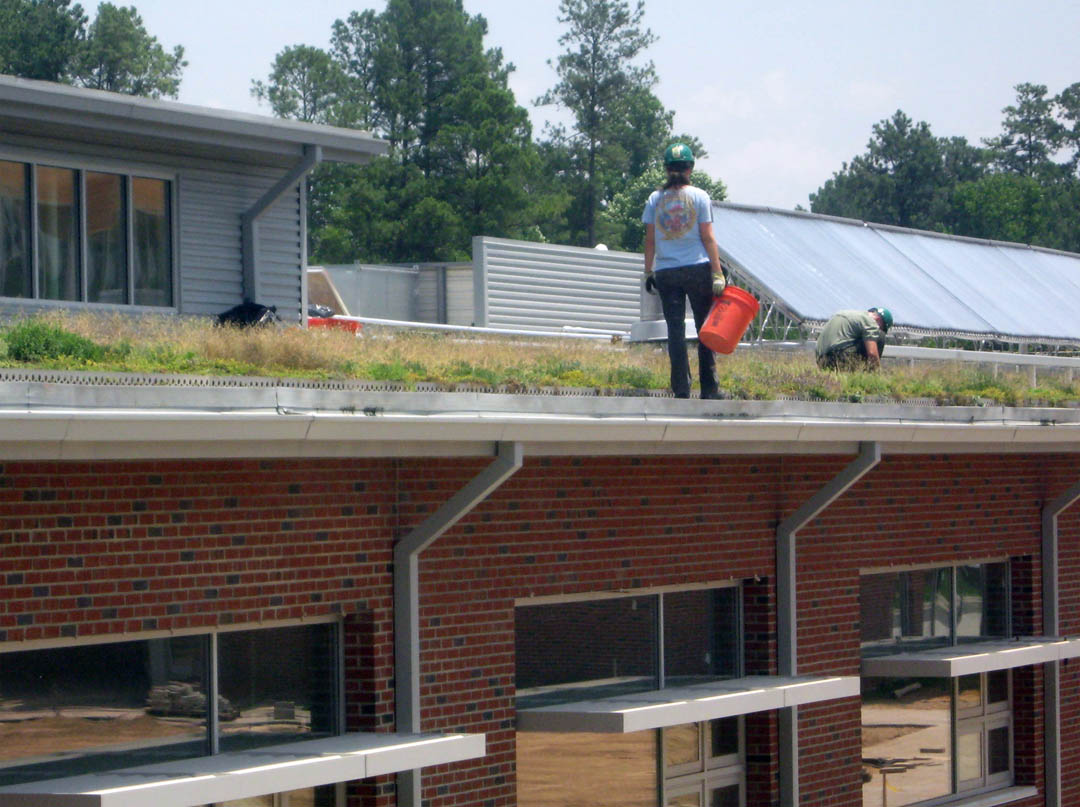
Workmen plant the vegetative roof on Central Carolina Community College’s new 18,000-square-foot Sustainable Technologies Center at the college’s Chatham County Campus, in Pittsboro. The Center, scheduled to open for classes in a few months, will house the college’s sustainable programs: biofuels, agriculture, green building/renewable energy, ecotourism, and organic culinary arts. The Center itself will be an example of sustainable building. The roof, planted with sedum, a drought-resistant succulent, will reduce heat radiation, insulate, decrease water run-off, and provide a habitat for birds and insects. The Center, designed by Cherry Huffman Architects, of Raleigh, will receive at least a Gold Level certification from the U.S. Green Building Council’s Leadership in Energy and Environmental Design (LEED) for energy efficient design and construction.
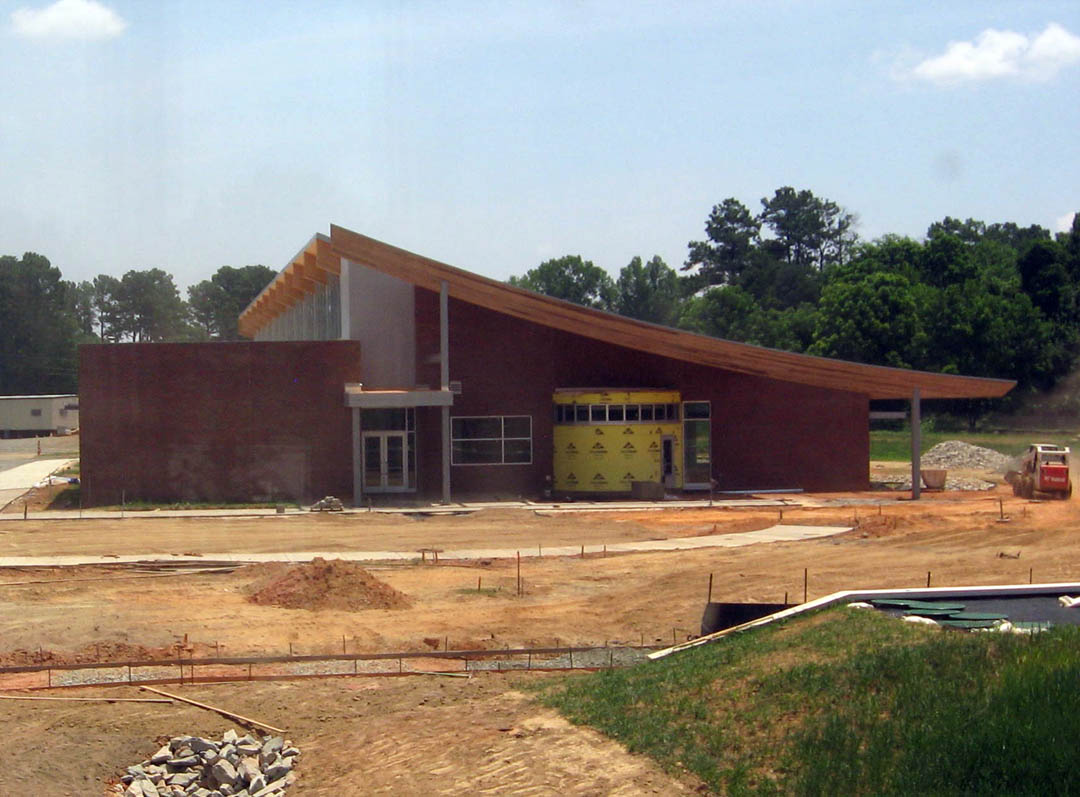
The new 25,000-square-foot Chatham Community Library is nearing completion on the Chatham County Campus of Central Carolina Community College. The facility will be operated by the county but used jointly by the county and college. The building features energy-efficient design, such as the over-hanging convex roof that diffuses sunlight entering the facility and is also part of a rainwater run-off collection system. The Library, designed by Cherry Huffman Architects, of Raleigh, will receive at least a Gold Level certification from the U.S. Green Building Council’s Leadership in Energy and Environmental Design (LEED) for energy efficient design and construction.
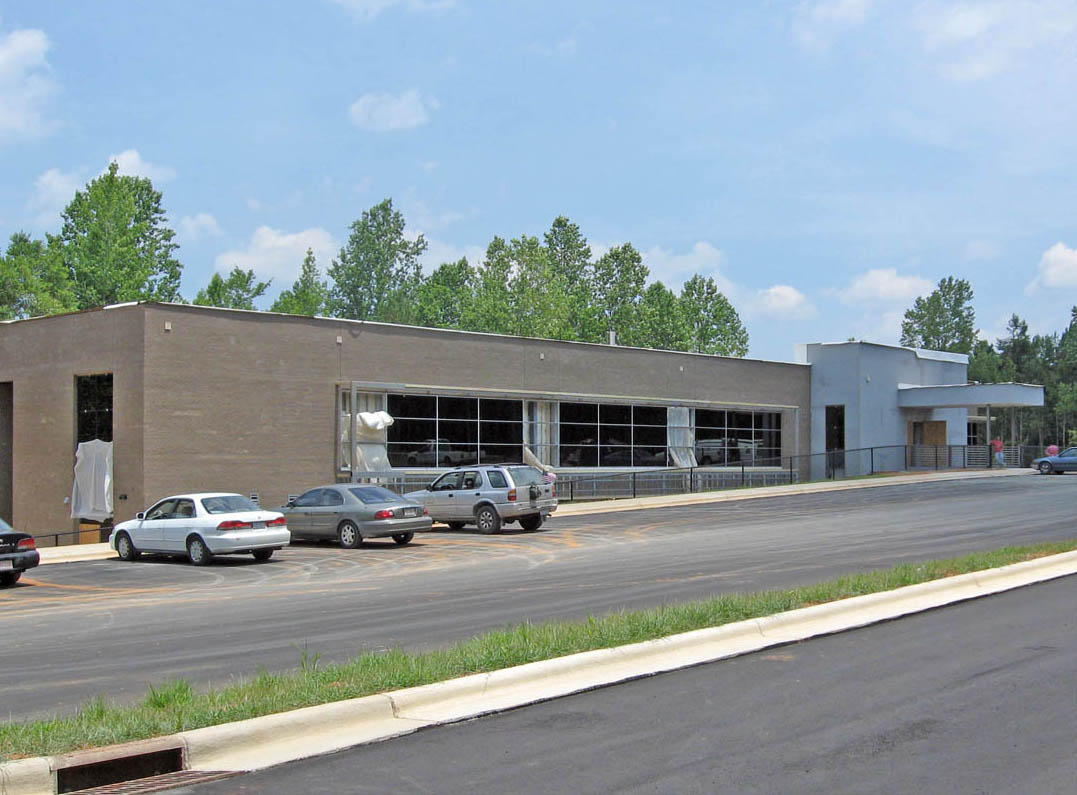
Central Carolina Community College’s new Siler City Center is well under way on a 41-acre site in the Central Carolina Industrial Park, in Siler City. The 23,322-square-foot Center is scheduled to open in January. It will house classroom, offices, student center, computer and class labs, vocational/industrial training shops, bookstore, and other services. The Center, designed by Hobbs Architects, in Pittsboro, will receive at least a Gold Level certification from the U.S. Green Building Council’s Leadership in Energy and Environmental Design (LEED) for energy efficient design and construction.
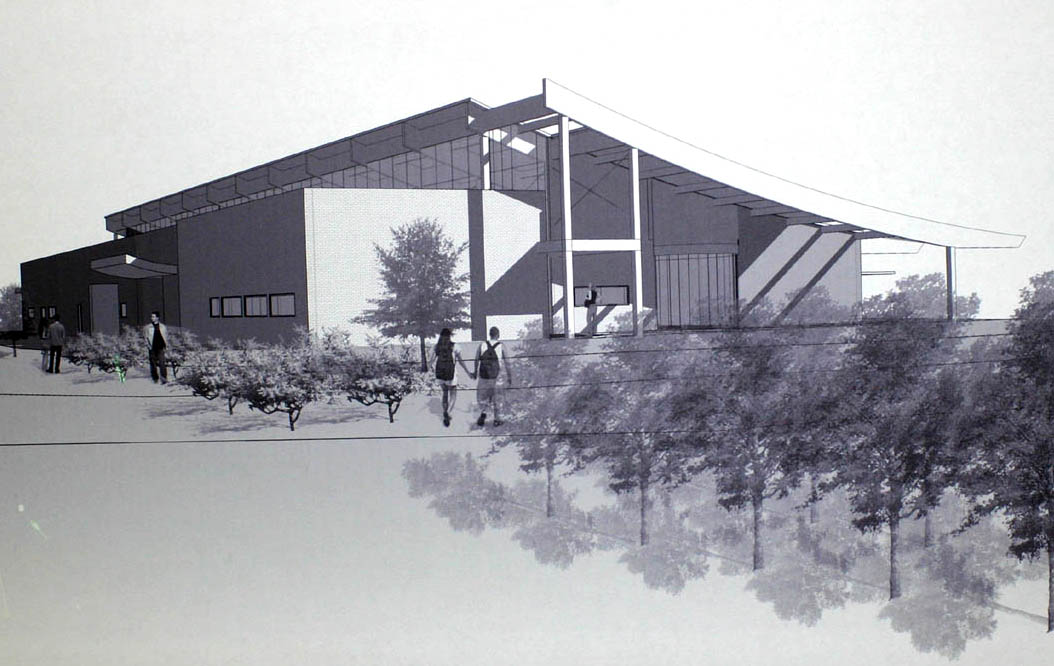
Computer render of the new 25,000-square-foot Chatham Community Library.
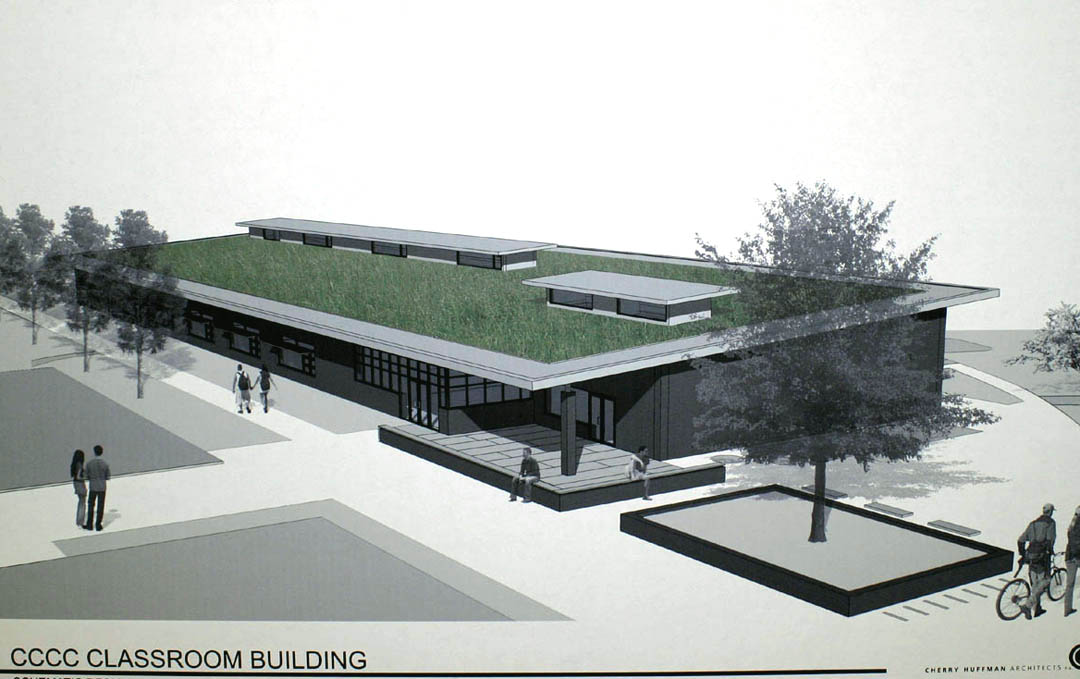
Central Carolina Community College’s new 18,000-square-foot Sustainable Technologies Center at the college’s Chatham County Campus, in Pittsboro, features a vegetative roof. The Center, scheduled to open for classes in a few months, will house the college’s sustainable programs: biofuels, agriculture, green building/renewable energy, ecotourism, and organic culinary arts. The Center itself will be an example of sustainable building. The roof, planted with sedum, a drought-resistant succulent, will reduce heat radiation, insulate, decrease water run-off, and provide a habitat for birds and insects. The Center, designed by Cherry Huffman Architects, of Raleigh, will receive at least a Gold Level certification from the U.S. Green Building Council’s Leadership in Energy and Environmental Design (LEED) for energy efficient design and construction.
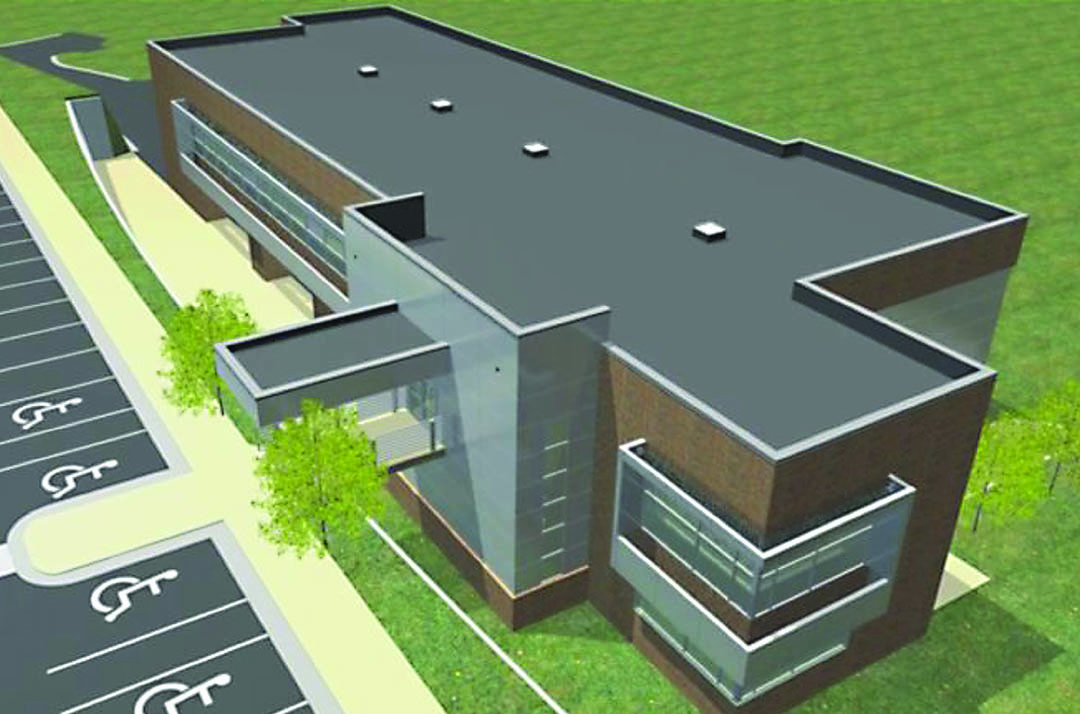
Computer render of the new Siler City Center.
- Central Carolina Community College
- Serving Chatham, Harnett, & Lee Counties, NC
- 1-800-682-8353






